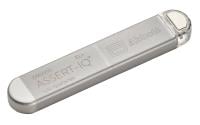Abbott has secured a CE mark approval in Europe for its long-term insertable cardiac monitor, designed to help monitor a patient’s heart rhythms remotely for up to six years.
The Bluetooth-equipped Assert-IQ is designed to record irregular heartbeats—including hard-to-catch cases of atrial fibrillation—and alert clinicians to the data necessary for choosing the optimal course of treatment. The device previously picked up an FDA approval in May 2023.
Abbott estimates that more than 33.5 million people worldwide have afib, making it the most common heart arrhythmia and a condition which, if left untreated, can increase a person’s lifetime risk of stroke.
Like other ICMs, Assert-IQ is slipped under the skin of the chest; the small, thin device checks the heart’s cadence every 20 seconds while uploading its findings to the user’s smartphone in what the company describes as virtually real time. Abbott also pegs the device’s total battery life as the world’s longest for a Bluetooth-enabled ICM.

“As the prevalence of abnormal heart rhythms rise, physicians increasingly rely on ICM technology to diagnose various heart conditions,” said Leonard Ganz, M.D., chief medical officer of Abbott's cardiac rhythm business.
The Assert-IQ offers two options to preserve the battery: The first, for more intensive, traditional monitoring, is aimed at diagnosing the cause of fainting spells or heart palpitations, with a life span of at least three years. The extended setting is designed for long-term monitoring of people at risk of developing an arrhythmia.
“Introducing Assert-IQ in Europe will expand access to transformative benefits of long-term monitoring and more clinically relevant information, and allow care providers to make clinical decisions faster and with more precision,” Ganz said in a statement.
Abbott previously launched its Jot Dx Bluetooth-enabled ICM in August 2021, with an average battery life of two years.